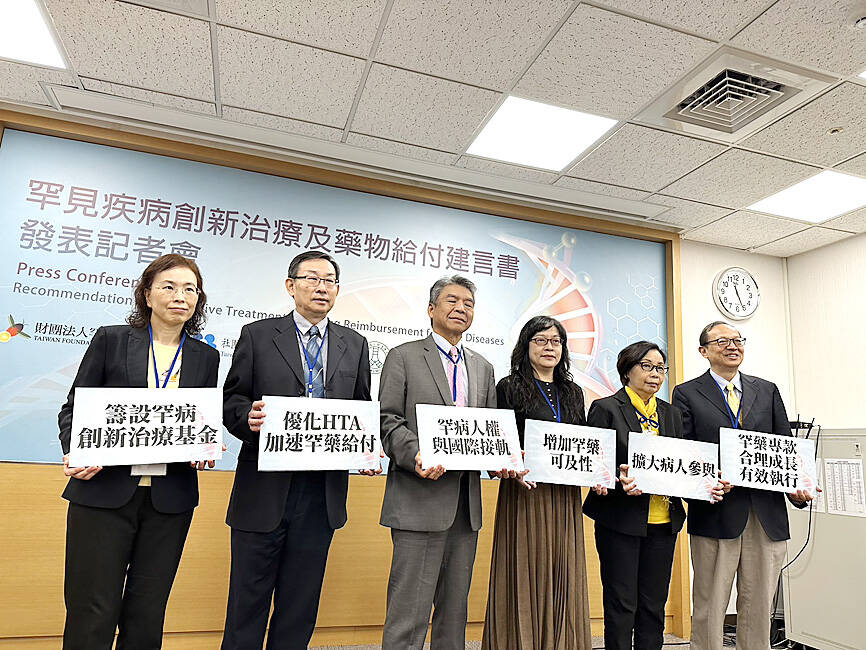The Taiwan Foundation for Rare Disorders yesterday released its “Recommendation on the Treatment and Drug Reimbursement for Rare Diseases,” and urged the government to speed up the inclusion of rare disease treatments in the list of drugs covered by National Health Insurance (NHI).
There are about 16,000 people with rare diseases in Taiwan, which does not amount to many votes, so their rights are often neglected by presidential candidates, foundation chairperson Serena Chen (陳莉茵) said, adding that they are not protected by commercial health insurance, and need help from the NHI system the most.
Medical advances have led to more treatments for rare diseases, but they are often very expensive, and of the NHI’s global budget of about NT$809.5 billion (US$25.04 billion) last year, drugs for rare diseases only accounted for about 0.95 percent, foundation chairperson Tsai Fuu-jen (蔡輔仁) said.

Photo: Yang Yuan-ting, Taipei Times
The candidates for January’s presidential election have not proposed any policies concerning the right to healthcare of people with rare diseases, so the foundation gathered some experts to discuss solutions and propose the “Recommendation on the Treatment and Drug Reimbursement for Rare Diseases,” he said.
It takes an average of 10 to 15 years to develop a new drug for a rare disease, so up to 70 percent of rare diseases still do not have proper treatment, the foundation said.
As of last month, there were 25 types of drugs for 28 types of rare diseases waiting to be included in the NHI coverage list, which would improve 6,053 people’s health and living quality, or even save their lives, it said.
Of the 25 types of drugs, there are 12 that are the only available treatment for certain diseases, and 1,591 people are still waiting for them, the foundation said, adding that 2,020 people have died before receiving treatment covered by NHI.
Since the second-generation NHI system was launched in 2013, the average time it takes to authorize a rare disease treatment for NHI coverage has increased from 5.2 months (between 1995 and 2012) to 29.9 months, while the approval rate dropped from 86.8 percent to 52.7 percent, the foundation said.
Yang Ming-chin (楊銘欽), an adjunct professor at National Taiwan University’s Institute of Health Policy and Management, said that the longer review time and reduced approval rate affects the opportunities people have to get proper treatment.
The unspent portion of the annual budget for rare disease treatment should be reserved for the next year, Yang said.
The foundation proposed several recommendations, including increasing accessibility to drugs for treating rare diseases, committing to the UN Resolution on Addressing the Challenges of Persons Living with a Rare Disease and their Families to protect their rights, allowing reasonable growth of the NHI special budget for rare disease treatment, accelerating the review on NHI coverage of rare disease treatment, allowing patient participation in assessments and reviews and expanding financial resources to support the development of new drugs.

Chinese Nationalist Party (KMT) Chairman Eric Chu (朱立倫), spokeswoman Yang Chih-yu (楊智伃) and Legislator Hsieh Lung-chieh (謝龍介) would be summoned by police for questioning for leading an illegal assembly on Thursday evening last week, Minister of the Interior Liu Shyh-fang (劉世芳) said today. The three KMT officials led an assembly outside the Taipei City Prosecutors’ Office, a restricted area where public assembly is not allowed, protesting the questioning of several KMT staff and searches of KMT headquarters and offices in a recall petition forgery case. Chu, Yang and Hsieh are all suspected of contravening the Assembly and Parade Act (集會遊行法) by holding

PRAISE: Japanese visitor Takashi Kubota said the Taiwanese temple architecture images showcased in the AI Art Gallery were the most impressive displays he saw Taiwan does not have an official pavilion at the World Expo in Osaka, Japan, because of its diplomatic predicament, but the government-backed Tech World pavilion is drawing interest with its unique recreations of works by Taiwanese artists. The pavilion features an artificial intelligence (AI)-based art gallery showcasing works of famous Taiwanese artists from the Japanese colonial period using innovative technologies. Among its main simulated displays are Eastern gouache paintings by Chen Chin (陳進), Lin Yu-shan (林玉山) and Kuo Hsueh-hu (郭雪湖), who were the three young Taiwanese painters selected for the East Asian Painting exhibition in 1927. Gouache is a water-based

Taiwan would welcome the return of Honduras as a diplomatic ally if its next president decides to make such a move, Minister of Foreign Affairs Lin Chia-lung (林佳龍) said yesterday. “Of course, we would welcome Honduras if they want to restore diplomatic ties with Taiwan after their elections,” Lin said at a meeting of the legislature’s Foreign Affairs and National Defense Committee, when asked to comment on statements made by two of the three Honduran presidential candidates during the presidential campaign in the Central American country. Taiwan is paying close attention to the region as a whole in the wake of a

OFF-TARGET: More than 30,000 participants were expected to take part in the Games next month, but only 6,550 foreign and 19,400 Taiwanese athletes have registered Taipei city councilors yesterday blasted the organizers of next month’s World Masters Games over sudden timetable and venue changes, which they said have caused thousands of participants to back out of the international sporting event, among other organizational issues. They also cited visa delays and political interference by China as reasons many foreign athletes are requesting refunds for the event, to be held from May 17 to 30. Jointly organized by the Taipei and New Taipei City governments, the games have been rocked by numerous controversies since preparations began in 2020. Taipei City Councilor Lin Yen-feng (林延鳳) said yesterday that new measures by